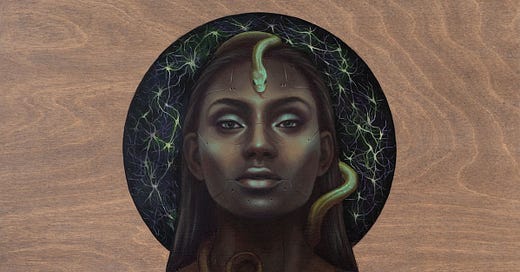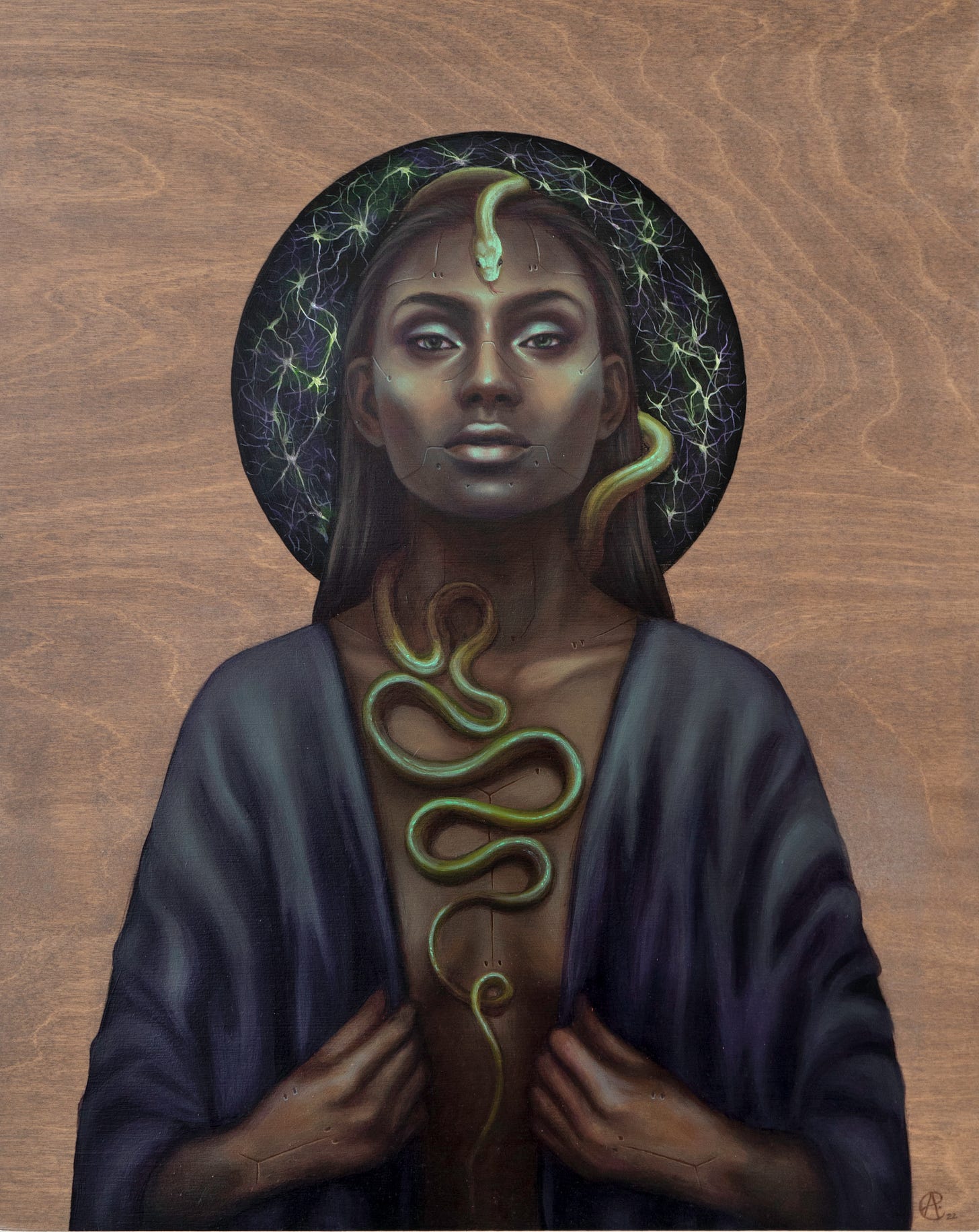The Great Techno-Myth
"The ways of technology, like the ways of god, are awesome and mysterious."- Neil Postman
I feel uneasy about technology. I'm not even sure what technology really is, but I know it's powerful and I know it's transforming us. The unsettling feeling that we are making ourselves anew with our tools without much foresight is palpable in the collective right now (at last). Tiny children running with scissors. It's all going so fast, too fast to keep up with, so we've given up intervening. It's ominous, like we've hit a point of no return. In the public discourse float words like surveillance state and existential risk but we can't stop the march of progress. Technology has taken a life of its own.
So, what is technology?
I ask Google.
Technology. Noun. "The application of scientific knowledge for practical purposes, especially in industry". So far, so good, not something to feel uneasy about. It sounds benign, neutral even. Still, this is probably the most surface-level definition of technology there is—a bit deceiving, too.
Technology is multidimensional, and as always, I'm interested in the hidden side of things.
I'm interested in technology as an archetype, a myth, an ideology, an epistemology. It's less of a "scientific" tool or product and more of an entity, an accidental god shaping our social reality. I'm interested in the place it's come to occupy in our collective imagination and in the ways it reduces and obscures, erases even, material reality. I'm interested in our collective passivity towards it, our intensifying enmeshment with it. I'm interested in our unconscious worship of technology, one that is made more powerful because it is invisible, fully embedded within our cognitive matrix of reality.
Someone who has shaped my understanding of technology is the late media theorist Neil Postman. I continually return to his essential book Technopoly: The Surrender of Culture to Technology, which he wrote in 1992 with astonishing foresight. In it, Postman draws attention to the ways in which technology seeps into the symbolic life of a culture, affecting human perception, understanding, feeling, and value. He traces the historical arc of our relationship with technology, from tool-using cultures, to technocratic societies, to Technopoly, a term he coined to denote a society in which “the culture seeks its authorization in technology, finds its satisfactions in technology, and takes its orders from technology”. A society in which technology assumes god-like status, in which culture no longer provides any moral guardrails. Our society.
In Technopoly, Postman rejects the naive belief in technology's neutrality and makes the case that technology is ideology: "embedded in every tool is an ideological bias, a predisposition to construct the world as one thing rather than another, to value one thing over another, to amplify one skill or attitude more loudly than another." Another way of saying this is that to someone with a hammer, everything looks like a nail.
Postman uses the example of computer technology, which, he says, has been incredibly effective at consolidating the Technopoly we live in. Computers make possible the mathematization of the world: facts become statistics, problems become equations. Reality can be modeled, outcomes predicted, crises averted. In some limited, specialized contexts, this is useful. But computers' bias for calculation, speed, efficiency, and information processing carries the implicit belief that "the most serious problems confronting us at both the personal and public levels require technical solutions through fast access to information otherwise unavailable.” As such, human progress is reduced to a matter of technological innovations.
Postman stresses the now widespread idea that we shape our tools and our tools shape us. Computer technology arises from a human-constructed, mechanistic worldview and simultaneously amplifies the human as machine/machine as human metaphor. We therefore aspire to behave more like machines, to be calculated, rational, efficient, and objective so as to not make emotional and/or contextual decisions. In fact, might as well delegate our thinking and decision-making to computers that appear to know best, and absolve ourselves of the responsibility of human choice and agency. Implied here is a serious lack of faith in human judgment, subjectivity, empathy, and basic goodness. Postman writes, "We have devalued the singular human capacity to see things whole in all their psychic, emotional, and moral dimensions, and have replaced this with faith in the power of calculation." What could go wrong?
Mechanistic metaphors work until a certain point but collapse under the complexity and mystery of who and what we are. Only the surface of things can be mapped, interiority gets left out—Instinct, emotion, Intuition; everything watery that moves us, directing how we act and what we create in the world. The living, animating Spirit of evolution and the enigmatic intelligence of biological organisms with their interwoven organs and interpenetrating psychic lives, defy such reduction. We remain interconnected social animals, oxytocin-driven, wired for adaptation and co-creation, capable of accessing insights from realms beyond the reach of standardized, computer-generated representations of knowledge. Would you trust computer insight? Society runs on it.
The mythologization of technology is the naturalization of something we've created, though we no longer remember we're the authors, the mythographers. As a myth, technology is therefore perceived as part of the natural order of things, as an expression of human evolution, while simultaneously redefining evolution, equating it to vague, indiscriminate notions of progress. Indeed, Technopoly's driving ideology is progress for progress's sake, its ultimate goal is to transcend all natural limitations, and to innovate indiscriminately, just because we can. Postman offers another definition of Technopoly: "a culture whose available theories do not offer guidance about what is acceptable information in the moral domain." Who needs ethics when unhindered progress is the new moral compass?
I can't write about my unease with technology without acknowledging the techno-fascist world order we are slipping into: the epitome of the Techno-Myth. It's so plain and clear now, the link, the lifeline, between power, technology, and knowledge. Nothing about it is neutral. Who gets to decide what technology gets made and to what end? Who owns the technology that society has grown dependent on? The simulacrum of science unfolds within a context that makes free inquiry unrecognizable, distorted by the hype of venture capital and the conviction that the only way to escape the mess we've made for ourselves is to create new technologies that'll rectify order and neutralize all externalities. Of course, Postman saw totalitarianism as the inevitable outcome of technology's attack on culture and wrote:
"Technopoly eliminates alternatives to itself in precisely the way Aldous Huxley outlined in Brave New World. It does not make them illegal. It does not make them immoral. It does not even make them unpopular. It makes them invisible and therefore irrelevant. And it does so by redefining what we mean by religion, by art, by family, by politics, by history, by truth, by privacy, by intelligence, so that our definitions fit its new requirements."
At this point, technology is fully woven into the fabric of our lives. As a myth, it lives on through each of us, so long as we remain unquestioning of its underlying ideological biases: mechanistic, progress-driven, risk-averse, control-oriented, and optimized for efficiency. This agenda has infiltrated every dimension of our lives. From education and reproduction to sex, politics, economics, foreign policy, communication, medicine, the arts, the environment, and beyond, I struggle to think of a single area untouched by technological imperatives. Can you?
My hope is that the challenges ahead will force us to develop a more nuanced understanding of technology, one that allows us to reclaim human meaning and values over the convenience and false certainty the Techno-Myth has offered us as a society. My hope is that we will realize that, as a false god, technology thrives on belief and blind worship. My hope is that we will draw a line and opt out.
Would love to hear your thoughts on this <3






I've been thinking about a similar uneasy feeling I get from the huge push of AI from tech corporations. Thanks for sharing a broader scope perspective that gives more context to this for me.
Technology is out of control and forcing humanity into dependence: but had it not been for technology, I would not have seen your art.